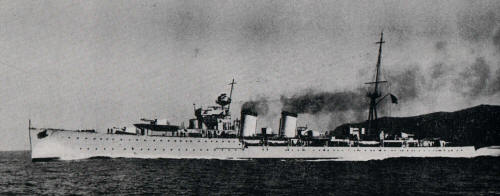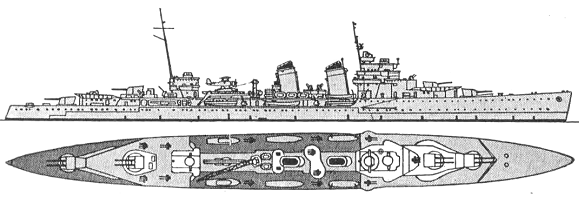
NAVYPEDIA
 Support the project with paypal
Support the project with paypal
Photo

Príncipe Alfonso 1927
Ships
| Name | No | Yard No | Builder | Laid down | Launched | Comp | Fate |
|---|---|---|---|---|---|---|---|
| Príncipe Alfonso, 4.1931- Libertad, 3.1939- Galicia | C11 | SECN, El Ferrol | 1.2.1917 | 23.1.1925 | 30.8.1925 | stricken 2.1970 | |
| Almirante Cervera | C12 | SECN, El Ferrol | 25.11.1922 | 16.10.1925 | 5/1927 | stricken 2.1965 | |
| Miguel de Cervantes | C13 | SECN, El Ferrol | 27.8.1926 | 19.5.1928 | 10.2.1930 | stricken 8.1964 |
Technical data
| Displacement standard, t | 7475 |
|---|---|
| Displacement full, t | 9237 |
| Length, m | 166.1 pp 176.6 oa |
| Breadth, m | 16.5 |
| Draught, m | 5.03 mean 6.00 max |
| No of shafts | 4 |
| Machinery | 4 sets Parsons geared steam turbines, 8 Yarrow boilers |
| Power, h. p. | 80000 |
| Max speed, kts | 33 |
| Fuel, t | oil 1675 |
| Endurance, nm(kts) | 5000(15) |
| Armour, mm | belt: 76 - 25, deck: 50 - 25, shields: 13, CT: 150 |
| Armament | 3 x 2 - 152/50 Vickers Mk U, 2 x 1 - 152/50 Vickers Mk T, 4 x 1 - 102/45 Vickers Mk L, 2 x 1 - 47/50 Vickers, 4 x 3 - 533 TT |
| Complement | 564 |
Standard scale images

Libertad 1936

Almirante Cervera 1937

Miguel de Cervantes 1960

Almirante Cervera 1960
Graphics
Project history
First two ships were planned under the law from 17.2.1915 as the second pair of Méndez Núñes class cruisers, but in 1919 it has been decided to suspend their building, having redesign the project taking into account First World War experience. Designing was conducted at active participation of Armstrong under the guidance of Philip Watts on the basis of British light cruisers of E class, therefore by 1921 the Spanish project of F class cruiser has been created. Such two ships according to the law from 11.1.1922 were ordered 14.7.1922. Third cruiser Miguel de Cervantes was built under the decree from 31.3.1926 and was ordered 4.7.1926. Hull and machinery practically completely repeated the British prototype, but arrangement of gears was not en echelon (from stem aftward 4 boiler rooms with two boilers in everyone and two engine rooms were placed). On trials Principe Alfonso has shown 34.7kts at 83000hp, and Miguel de Cervantes has reached 35.6kts, last cruiser had also increased fuel stowage. Ships differed by good seaworthiness and were capable to keep high speed for a long time.
Ship protection
Protection was rather weak, the 76mm main belt closed 40% of hull length, covering only machinery, at ship ends belt thickness was 51mm, decreasing to 25mm near stem and to 38mm near stern.
Modernizations
late 1936, Libertad: + 4 x 2 - 13.2/76
11/1936, Almirante Cervera: + 1 x 1 - 20/65 C/30
4/1938, Almirante Cervera: - 4 x 1 - 102/45, 2 x 1 - 47/50; + 4 x 1 - 105/42 SK C/32, 3 x 1 - 20/65 C/30
to spring 1939, Galicia: - 1 x 1 - 102/45, 2 x 1 - 47/50; + 2 x 1 - 76/35 Vickers FF, 2 x 1 - 40/56 Bofors M1936, 1 x 2 - 25/60 M1938, 4 x 1 - 20/70 Oerlikon M36
to spring 1939, Miguel de Cervantes: - 1 x 1 - 102/45, 2 x 1 - 47/50; + 2 x 1 - 76/35 Vickers FF, 1 x 1 - 40/56 Bofors M1936, 2 x 1 - 20/70 Oerlikon M36
1943, Almirante Cervera: + 4 x 2 - 37/80 SK C/30, displacement was 7976/9660t
(1940-12/1944, SECN, El Ferrol), Galicia; (1940-4/1946, SECN, El Ferrol), Miguel de Cervantes: new armament consisted of 4 x 2 - 152/50 Vickers Mk U, 8 x 2 - 37/83 SK C/30, 5 x 4 - 20/65 C/38, 2 x 3 - 533 TT, 4 DCT; Miguel de Cervantes additionally received a catapult (1 He 114 seaplane); displacement was 8051/9748t, 31.5kts, 1567t of oil, 4000(15)nm, complement 781.
1957, Galicia, Miguel de Cervantes: - 2 x 3 - 533 TT; + radars
1957, Almirante Cervera: - 4 x 3 - 533 T; + radars
late 1950s, Almirante Cervera: - 4 x 1 - 105/45; + 4 x 2 - 37/83 SK C/30
Naval service
Libertad and Miguel de Cervantes 19.7.1936 have transferred under the control of Republic. Repaired in a dock Almirante Cervera 21.7.1936 has been captured by troops of Nationalists. Miguel de Cervantes at Cartagena 22.11.1936 received two torpedo hits from Italian submarine Evangelista Torricelli: one boiler and engine rooms were foundered, repair lasted till March, 1938. pro-Franco mutiny in Cartagena 5.3.1939 both cruisers as part of main forces of Republican fleet left to Bizerte (French Tunisia), where two days later have been interned. Both were transferred to Nationalists 31.3.1939. Galicia and Miguel de Cervantes by the war end were in bad technical condition, therefore after returning to Spain they were laid up into reserve with full disarmament. Since 1940 they have passed major repairs with considerable conversion at El Ferrol under the project 133.
1951
 HOME
HOME FIGHTING SHIPS OF THE WORLD
FIGHTING SHIPS OF THE WORLD SPAIN
SPAIN CRUISERS
CRUISERS PRÍNCIPE ALFONSO light cruisers (1925-1930)
PRÍNCIPE ALFONSO light cruisers (1925-1930)


